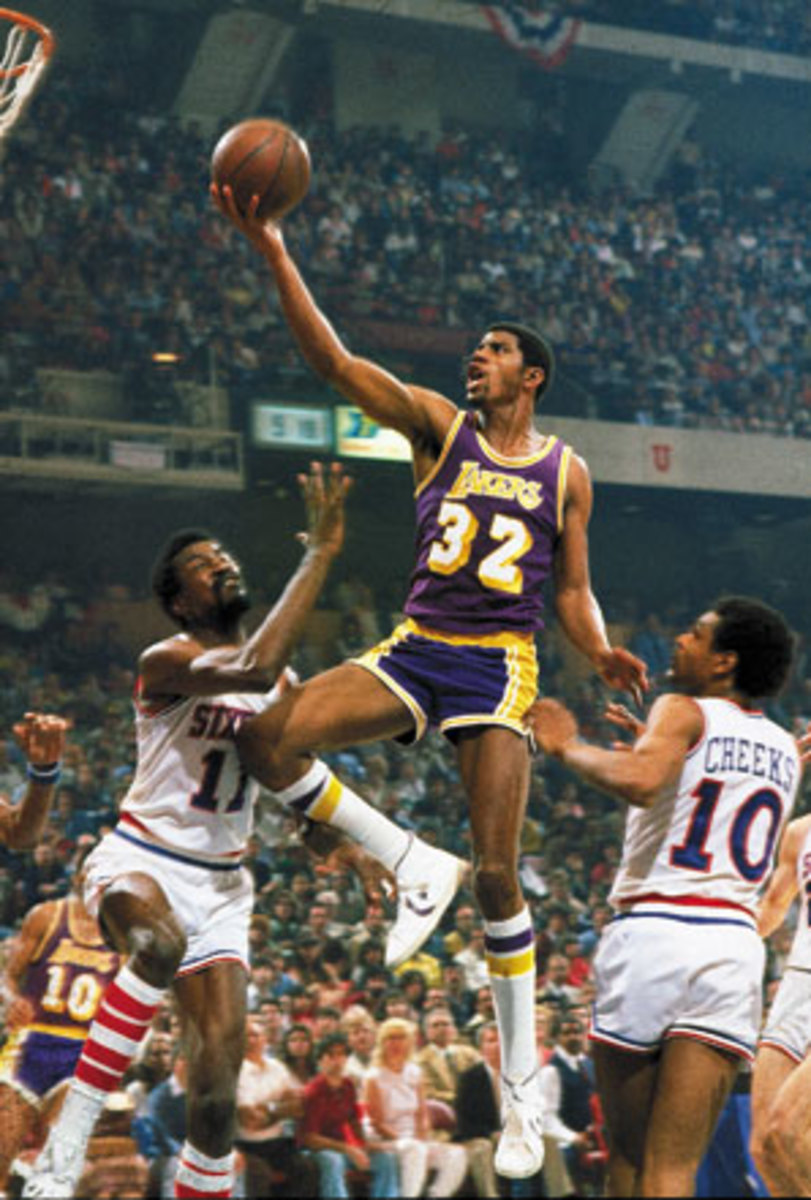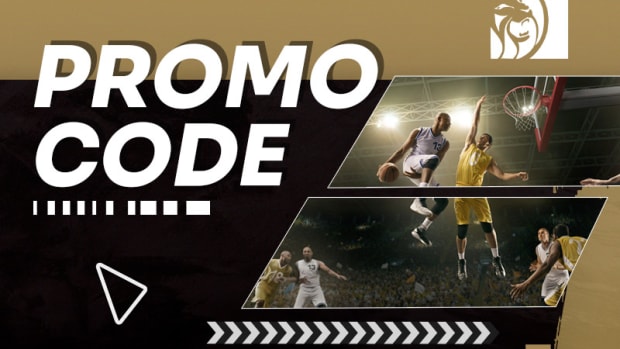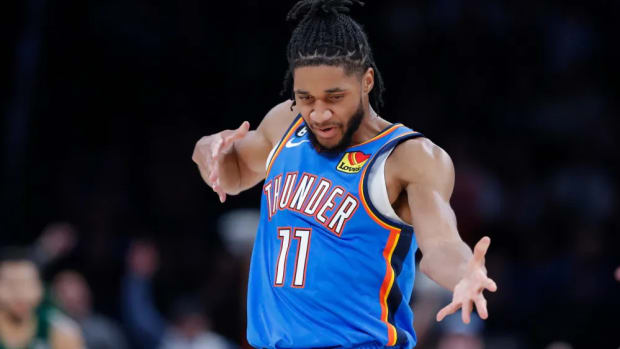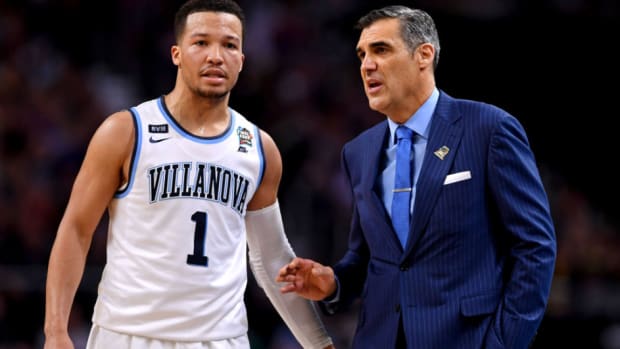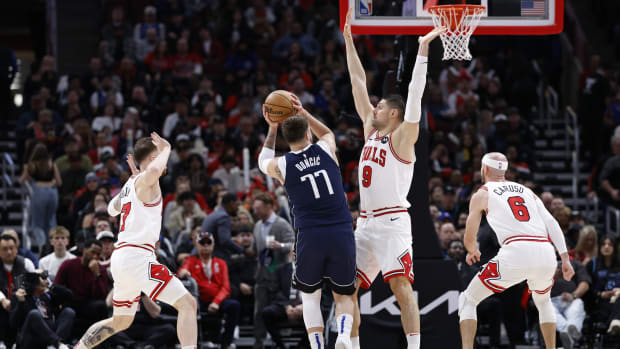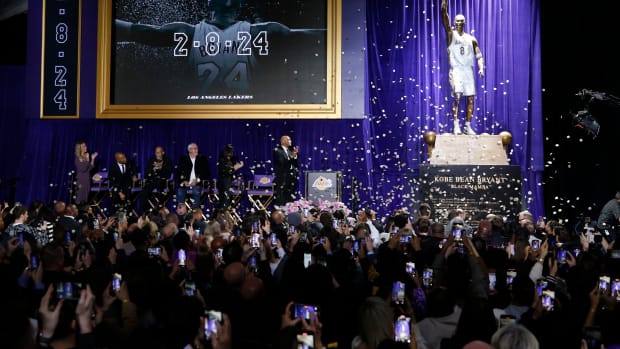Revisit to 1980s NBA proves LeBron's comment wrong
"Hopefully the league can figure out one way where it can go back to the '80s where you had three or four All-Stars, three or four superstars, three or four Hall-of-Famers on the same team," James said. "The league was great. It wasn't as watered down as it is [today]."
He went onto talk about shifting Kevin Love from the losing Timberwolves to shore up a winning franchise, or transferring Nets stars Brook Lopez and Devin Harris to "a team that could be really good."
The problem with this argument is that most NBA teams nowadays can't afford to pay more than a few highly talented players. The 1985-86 champion Celtics were able to maintain a roster of five Hall of Famers because there was no unrestricted free agency and no such thing as a "max contract" in the collective bargaining agreement of that era.
A cliché of today's NBA is that so many young players who average 20 points for a few years behave as if they're deserving of a "max" deal. The goal of being recognized as a max player -- a bargaining position enhanced by the leverage of unrestricted free agency -- has enabled players like Rashard Lewis, Michael Redd, Andrei Kirilenko, Gilbert Arenas, Zach Randolph, Kenyon Martin, Elton Brand and Peja Stojakovic to each be paid more than $15 million this season.
When players of the modern era began to compete for max contracts -- CBA language that entitles a player with seven or more years of NBA experience to 30 percent of the cap -- it became fiscally unfeasible for all but the richest teams to absorb three max players.
Under the system of today, it is unfathomable that the Celtics of 1985-86 would have been able to keep future Hall of Famers Larry Bird, Kevin McHale, Robert Parish, Dennis Johnson and All-Star Danny Ainge -- all in their career primes -- along with Walton, another future Hall of Famer. Wouldn't Bird, McHale and Parish each have been entitled to 30 percent? How much money would have been left for DJ and Ainge? What about Walton and Scott Wedman, another fine player on that Celtics team? The Celtics would not have had enough money to keep all of them in the same locker room.
As my colleague Zach Lowe pointed out, the '80s NBA wasn't deep with great teams. Look at the Lakers' dominance of their conference and you'll realize what a joke the West was in the '80s. Those Los Angeles teams endured one difficult postseason in the West -- in 1988 the Mavericks and Jazz each pushed the Lakers to a Game 7, mainly because Kareem Abdul-Jabbar was 41 years old and on his way to a final championship. During their other eight runs to the NBA Finals around Magic Johnson from 1980 to '91, the Lakers went a preposterous 79-14 in the Western playoffs. Talk about a watered-down league: The best teams in the conference were losing to the Lakers at an 85-percent rate.
The league has expanded by six teams since the 1980s, but compensating for that expansion has been the creation of new international markets for NBA imports like Dirk Nowitzki, Manu Ginobili, Tony Parker, Pau and Marc Gasol, Yao Ming, Andrew Bogut, Leandro Barbosa, Nene, Anderson Varejao, Nicolas Batum, Rodrigue Beaubois, Boris Diaw, Luol Deng, Omri Casspi, Andrea Bargnani, Danilo Gallinari, Andris Biedrins, Zydrunas Ilgauskas, Kirilenko, Stojakovic, Jose Calderon, Rudy Fernandez, Jonas Jerebko, Thabo Sefolosha, Mehmet Okur, Hedo Turkoglu and so on. There are more teams but there is also a much larger market for player development -- and many of the players from other countries are actually schooled in the fundamentals.
The 1980s NBA was indeed terrific. The era was defined by team rivalries -- first among the Lakers, Celtics and 76ers, and later introducing the Pistons and emerging Bulls -- which existed because the rest of the league was so uncompetitive that the best teams were assured of meeting in the playoffs year after year. They played a fluid, high-scoring style, and the two biggest stars -- Magic and Larry -- were exquisite passers who could have been selfish scorers but instead were devoted to their teams. Then you had all of the other aspects of that Lakers-Celtics rivalry -- black vs. white, West coast vs. East coast and the timelessness of the NBA's two winningest franchises competing year after year.
If James wants to create his vision of the glorious '80s in which a number of teams each have three or four superstars, he needs to focus less on the number of franchises and more on a new salary system that enables each team to pay a larger number of stars simultaneously. But something tells me neither he nor his union wants to go there.
Now let's answer some of your questions rescued from the spam (and Facebook) ...
Now that the Rockets are reportedly willing to trade Yao Ming, where do you think is the best spot for the big man? Which teams could use him ... if/when he's ever healthy?-- Larry, Lafayette, La.
Too many moving parts to figure this one out, Larry. If the Rockets move Yao's expiring contract, they'll be seeking to replace him with a star player. Will they be able to negotiate a package to pry Carmelo Anthony out of Denver? That's the first question.
Next think about the team that would acquire Yao. Would his new employer be seeking nothing more than to dump his salary in preparation for the next collective bargaining agreement? Or would a franchise like Golden State invest in Yao with the hope that he'll create interest from the Asian market of San Francisco?
If the next CBA shortens contracts and reduces guaranteed money for players, then more teams may be willing to take a risk on Yao. A healthy 7-foot-6 All-Star center could instantly redefine a struggling franchise like Minnesota or Cleveland.
But I'm guessing that Yao hasn't even begun to discuss these possibilities with his agent Bill Duffy. Everything coming out of his camp suggests he is focusing solely on restoring his health, because if he can't play, then all of the other machinations won't make much difference to him anyway.
I have been reading all the rumors of Dwight Howard and how the Magic still have to do a lot to keep him when he becomes a free agent in 2012. Isn't it a bit early to be concerned with the class of 2012, especially with a potential lockout looming?-- Dave, Tampa, Fla.
You're raising a good point, Dave, with a lesson to be learned from Cleveland. Cavs owner Dan Gilbert has admitted that his team spent the last several years developing their roster to sync with each deadline imposed by LeBron James' contract status; in hindsight Gilbert wished he had built the strongest team possible without concern for appeasing James.
In 1996, Orlando wasn't able to hold onto Shaquille O'Neal as a free agent, and they don't want to lose another No. 1 center in 2012. But even if Howard was under contract for five more years, the Magic would still be under pressure to win a title soon: They're committed to an extremely high payroll, they need to be championship-relevant in order to keep the revenue flowing out of their large new arena, and the organization is committed to winning a ring for 84-year-old owner Rich DeVos. Howard's impending free agency joins the long list of reasons for the Magic to win now.
Depending on the length of a potential lockout (which could wipe out all of next season) and the rules of the next collective bargaining agreement (which could force the Magic to unload payroll to squeeze under a hard salary cap), this may be their last run at the championship with this team. The future is difficult to predict because no one can be sure what the new rules will bring, which is another reason why Orlando is focused on trying to accomplish all of its goals -- including the retention of Howard for the long term -- in the here and now.
Shouldn't the Lakers be concerned after their awful showing at home against the Heat on Christmas? I mean, what's happened to them?-- Aaron, Los Angeles
They've been to three straight Finals, which amounts to 67 extra games for a team led by Kobe Bryant, now in his 15th season. The Lakers launched the opening two months against the league's weakest schedule, so naturally they glided along while waiting for the return of center Andrew Bynum. Now that they've been embarrassed by Miami and San Antonio on the eve of the New Year, the Lakers will begin to focus on renewing their discipline for the final four months of the regular season.
The Spurs have been in this ho-hum position before only to pull themselves together in January to win the championship. Last year, the Celtics closed the season at 27-27 before renewing themselves in the playoffs to come within a half of winning the title. The Lakers have plenty of time, talent and experience to return to the top, and everything we know about Bryant and coach Phil Jackson suggests they'll figure it out.
Would it be worth it to the Clippers to trade Baron Davis? Who would be potential trade partners if they do shop him?-- Barrett, San Jose, Calif.
They'd like to unload Davis' salary, but his contract is a hard sell at $42 million over three years (including this season). Here's the obvious question: If Washington was able to move the contract of Gilbert Arenas with four years left at $80 million, then shouldn't the Clippers be able to deal Davis? But a couple of big differences worked in Washington's favor: At 28, Arenas is three years younger than Davis, and the last time Arenas was healthy he averaged 27.7 points as an All-NBA guard for three straight years through 2006-07 -- standards that Davis has never achieved.
The Magic hope Arenas will give them the firepower to compete for a championship, now that he's healthy and in his prime years. Davis is unhealthy and on the wrong side of 30, and he can't promise to elevate a team to title contention. Davis has said he wants to stay in Los Angeles, so the best hope for the Clippers is that he'll regain his health and prove to be worth his salary over the second half of the season.
Through the first 30 games of the season, the Bulls' most glaring hole is a stable shooting guard who can work well opposite Derrick Rose, provide solid defense and not become an offensive liability when taking shots. If you were Gar Forman/John Paxson, what would you do: Jump now to fill that hole and find that shooting guard, or wait until the trade deadline, hedging your bets that the cost to get one would go down? Or, do you bite the bullet on this 2010-11 season, depending on the three-man combo of Bogans, Brewer and Korver, and see what options are available in the offseason?
Also, which shooting guard (either available via trade at the deadline or in the offseason, or offseason free agent) would be the best to fit Tom Thibodeau's system? Which one do you yourself think would be the best to complement the emerging next-gen Bulls trio of Rose-Carlos Boozer-Joakim Noah? Did Orlando's matching offer for J.J. Redick and the Bulls' subsequent draft-day trade of Kirk Hinrich to Washington put the them in this tough predicament?-- Qumar Zaman (from Facebook)
Let's say the Bulls decide Ronnie Brewer isn't the answer at shooting guard. The best player they could plug in via trade is Charlotte's Stephen Jackson, who would provide everything they need -- but at a price they don't want. Jackson is making $8.4 million this year (his three-year deal is worth $27.8 million), and when you consider the commitments to Chicago's other starters -- Boozer, Noah, Luol Deng and Rose all are or will soon be making big money -- the Bulls probably would recoil from Jackson's contract.
If the Bulls are looking for a less-expensive resolution, then they need to acquire someone like 6-foot-5 Arron Afflalo, a defender with three-point range (currently shooting 42.7 percent from deep) who was salvaged last season by the Nuggets after playing short minutes his first two seasons with Detroit. If the Bulls can't find the next Afflalo hiding at the end of a rival team's bench, then they can pick him up in the draft. Most teams are looking for outright scorers at shooting guard, which means the Bulls can use their first-round pick (likely in the 20s) on a complementary defender/shooter like Afflalo or Portland's Wesley Matthews, who went undrafted in 2009 before emerging as a defender/scorer for Utah last season.
An upgrade at shooting guard isn't going to turn the Bulls into champions this season, as they're developing for the next era with hope for continued improvement from Rose and Noah. Along the way they should be able to resolve their issues in the backcourt alongside Rose.






























